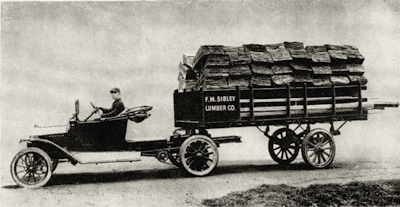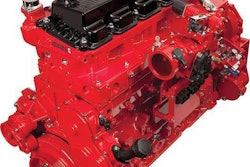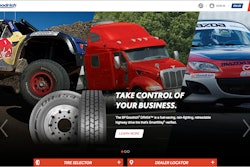
According to Fruehauf’s account, her grandfather’s company facilitated the growth of continental transportation as a viable alternative to rail and brought efficient transportation from the farmer’s gate and the factory’s loading door. This expanded markets for all manner of enterprises across the country.
It all began in 1914 in Detroit, Michigan, where German immigrant August Fruehauf was a well-known and accomplished blacksmith and wagon maker. A local lumber tycoon needed to transport an 18-foot boat to a lake house and preferred to do so with his new Model-T roadster. He asked Fruehauf if he could convert a wagon to haul behind the Model-T.
It took August and his partner, Otto Neumann several days to create a solution that would accomplish their customer’s goal. They shaped and bolted a sturdy two-wheeler that hooked to the rear of Sibley’s Model-T frame with a pole that acted as tongue and brake. They removed the back seat of the Model-T roadster to support the front end of the wagon and devised a coupling to hitch the wagon to the car. August called it a semi-trailer. Henry Ford responded by canceling the warranty on the Model-T.
Their customer, Frederick Sibley, was so pleased with the performance of the rig that he returned the following month and submitted an order for several more semi-trailers to use in his lumberyard. Other lumber merchants recognized Sibley’s advantage and were quick to follow suit.
By 1918 August Fruehauf needed to incorporate the growing business and the Fruehauf Trailer Company was founded. The new company’s inventory did not list a single horseshoe when they signed their incorporation papers.
As the practicality of the semi-trailer idea was demonstrated, larger trucks, replacing improvised passenger cars, were immediately purchased and placed in service by forward-looking businesses. Fruehauf trailers had now arrived on the American road. By 1919, with the nation whirling in a postwar business boom, Fruehauf sales zoomed to a whopping $302,000. August’s motto was, “A horse can pull more than it can carry; so can a truck!”
The Fruehauf Trailer Company created the first flatbed semi-trailer, van trailer, ground-hugging carryalls, refrigerated trailer, adjustable pole-trailers, tandem trailers and commodity tankers for bulk food stuffs, fuel oil or chemicals. They introduced hydraulic lift gates and in 1919 developed their own patented fifth-wheel coupling. In 1926 they automated this device allowing a trailer to be coupled and uncoupled mechanically by the power of the tractor’s engine. Innovations like piggybacking and fishybacking, which later became known as container shipping, were introduced after WWII.
August Fruehauf educated in the old fashioned ethics of his German forbears, believed that the customer was the boss. His company’s creed: “Do a good job, put everything into it of materials and workmanship, and take a pride in your work whether you get paid for it or not.” He demanded the same ethic from his employees and his sons who joined him in the company.
Despite the Great Depression, sales had reached $3,759,000 by 1929. And the following year August retired, leaving the company in the hands of his three sons.
According to Ruth Ann Fruehauf, to say that the Fruehauf Trailer Company was the General Motors of its industry understates the case. Not only was Fruehauf the biggest firm in the field, it sold more trailers than all the others put together.
The Fruehauf Trailer Company became a global giant with over 90 branches throughout the United States and plants and subsidiaries worldwide. In 1997 Fruehauf was ranked 75th among the largest companies worldwide. But it couldn’t last. In subsequent bankruptcy proceedings, international subsidiaries became independent and the U.S. company was purchased by Wabash National. Fruehauf Trailers are still being produced around the world in countries like France, Germany and New Zealand. These companies still model the philosophies of August Fruehauf.










